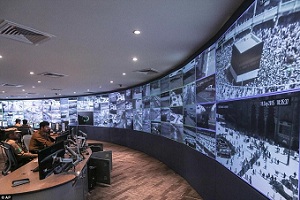Though the United States is a country that preaches about freedom and China is known as an authoritarian state, a new report from PreciseSecurity.com claims the U.S. actually has more surveillance cameras per person. China has more CCTV cameras overall, but the U.S. is ahead when you break down the numbers of cameras per capita. The United States has roughly 50 million cameras in total compared to China’s roughly 200 million. For perspective, the United States has around 330 million people compared to China’s population of nearly 1.4 billion.
“The United States has 15.28 CCTV cameras every 100 individuals, followed by China with 14.36 and the United Kingdom with 7.5,” the report reads. Jay Stanley, senior policy analyst with the ACLU Speech, Privacy, and Technology Project, says that it’s a bit surprising that the U.S. is outpacing China in this way.
“It’s an indication of just how rapidly surveillance technology is spreading in America,” Stanley says. He says it is now possible to “utterly blanket our public spaces with surveillance cameras,” and it would probably be affordable, but that doesn’t mean it should be done.
Russia is known as a surveillance state, and it may have more cameras per capita than the U.S., but this report was unable to establish that. There is only data available on how many CCTV camera cameras Russia has for some of its cities. The report found around 196,000 CCTV cameras are operating in Moscow and St. Petersburg combined.
Chicago is one of the most surveilled cities in America with roughly 35,000 cameras. New York, surprisingly, has fewer cameras with around 11,000. Another report on city surveillance from earlier this year found Atlanta is the most surveilled city in America per capita, with roughly 7,800 cameras for around half a million people. Some might not find these cameras concerning and might assume they help keep us safe. However, there’s evidence that this is not necessarily the case. While cameras do help law enforcement catch criminals, security experts say we’re simply surveilling too much. If you have thousands and thousands of cameras doing surveillance 24 hours a day, it’s hard to figure out what footage might actually be useful. Furthermore, the cameras don’t even appear to help prevent crime. Studies from around the world have found CCTV cameras often aren’t helpful when you’re trying to solve a crime and don’t deter criminals.








